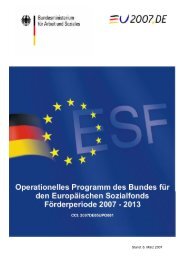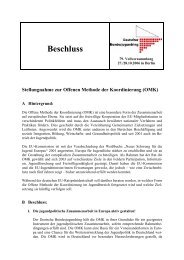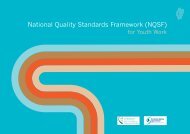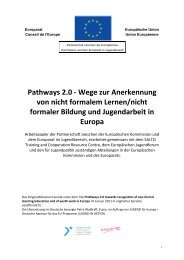Report - Salto
Report - Salto
Report - Salto
You also want an ePaper? Increase the reach of your titles
YUMPU automatically turns print PDFs into web optimized ePapers that Google loves.
68<br />
Bridges for Recognition | Hot Issues discussion groups<br />
Individual “hot issues” and some background information<br />
Strand one: Preconditions<br />
1. Predisposition of Youth Organisations to take part in the validation of non-formal and<br />
informal learning: what is the situation now and how can it be stimulated?<br />
A very basic issue when reflecting about validation issues in the Youth sector is around the degree<br />
to which Youth organisations are willing and capable of engaging in validation initiatives. The<br />
key question is the extent to which Youth organisations actually see themselves as “educational<br />
agencies”. For many Youth organisations such as Student Associations and volunteer agencies<br />
the mission of their organisation (for instance environmental issues, human rights issues, etc.) is<br />
their main focus. The issue of education can be of relative minor importance for them, or an issue<br />
where they are not ready to invest their scarce resources and time. How can these organisations<br />
be made aware of their educational value and what incentives can be made available to them to<br />
increase their involvement in validation?<br />
2. Division of responsibilities: Who is to do what in validation?<br />
Bringing Youth Organisations and young people into validation further will require the<br />
establishment of clear responsibilities for them and other policy actors. This group would discuss<br />
who should be made responsible to identify, assess, and document non-formal learning in the<br />
Youth sector to maximise take up. Should it be Youth organisations, the European Union, national<br />
institutions (government, other bodies), Youth workers and/or young people? What difficulties<br />
are there ahead? E.g. Youth organisations have limited resources and thus may not be willing<br />
to invest funds to set up learning evaluations, assessments or anything else that basically costs<br />
money and draws them away from their main mission. How can benefits of validation issues be<br />
made clear to different stakeholders so that they are willing to take their share of responsibility<br />
in validation?

















